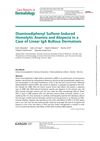 1 citations,
May 2023 in “European Journal of Human Genetics”
1 citations,
May 2023 in “European Journal of Human Genetics” Rare ULBP3 gene changes may raise the risk of Alopecia areata, a certain FAS gene deletion could cause a dysfunctional protein in an immune disorder, and having one copy of a specific genetic deletion is okay, but two copies cause sickle cell disease.
 July 2024 in “Deleted Journal”
July 2024 in “Deleted Journal” The Ayurvedic program effectively manages hair loss due to iron deficiency anemia.

Iron deficiency anemia can cause itching, which often improves with iron supplements.
 October 2023 in “The American Journal of Gastroenterology”
October 2023 in “The American Journal of Gastroenterology” Cronkhite-Canada syndrome is rare, with high mortality and cancer risk, needing more research for treatment guidelines.
 October 2023 in “Journal of Family Medicine and Primary Care”
October 2023 in “Journal of Family Medicine and Primary Care” More awareness and education on iron deficiency anemia are needed in Riyadh.
 May 2022 in “International Journal for Research in Applied Science and Engineering Technology”
May 2022 in “International Journal for Research in Applied Science and Engineering Technology” Iron supplements combined with Quilib lotion effectively treat hair loss in people with iron deficiency anemia.
 January 2018 in “The Egyptian Family Medicine Journal”
January 2018 in “The Egyptian Family Medicine Journal” Iron deficiency anemia is significantly linked to hair loss in childbearing women, and taking iron improves the condition.
14 citations,
January 2020 in “Women's health reports” Iron deficiency in menstruating women causes many health issues beyond anemia and needs early detection and treatment.
 October 2022 in “Egyptian Journal of Health Care”
October 2022 in “Egyptian Journal of Health Care” Female nursing students with iron deficiency anemia have poor knowledge and practices regarding iron intake, needing better health education and physical monitoring.
 February 2024 in “Journal of ayurveda and integrated medical sciences”
February 2024 in “Journal of ayurveda and integrated medical sciences” Ayurvedic medicine helped increase a young woman's hemoglobin levels and improved her anemia symptoms.
 2 citations,
July 2015 in “Case Reports in Dermatology”
2 citations,
July 2015 in “Case Reports in Dermatology” DDS treatment for LABD can cause severe side effects like anemia and hair loss, requiring careful monitoring.
 100 citations,
July 2018 in “Journal of The American Academy of Dermatology”
100 citations,
July 2018 in “Journal of The American Academy of Dermatology” People with alopecia areata often have other health issues like skin diseases, metabolic syndrome, stomach infections, lupus, anemia, thyroid problems, mental health issues, vitamin D deficiency, and hearing and eye problems.
 19 citations,
January 2016 in “Dermatology Research and Practice”
19 citations,
January 2016 in “Dermatology Research and Practice” The study concluded that hair loss in Indian women is not significantly linked to anemia or thyroid problems, but checking thyroid function could help those with ongoing hair loss.
 11 citations,
January 2011 in “Turkish Journal of Medical Sciences”
11 citations,
January 2011 in “Turkish Journal of Medical Sciences” Low iron levels are a significant risk factor for hair loss, while high vitamin D levels might be a response to hair loss, not a cause.
 10 citations,
January 2015 in “Journal of Dermatology and Dermatologic Surgery”
10 citations,
January 2015 in “Journal of Dermatology and Dermatologic Surgery” Hair loss in adult females in Makkah is often linked to iron-deficiency anemia and thyroid issues.
 1 citations,
July 1996 in “Clinical and Experimental Dermatology”
1 citations,
July 1996 in “Clinical and Experimental Dermatology” Routine thyroid tests for diffuse alopecia in women may not be necessary, but checking for iron deficiency anemia could be useful.
 September 2024 in “Bulletin of the Russian Military Medical Academy”
September 2024 in “Bulletin of the Russian Military Medical Academy” Iron deficiency is common in female military personnel but doesn't significantly impact daily physical activity.
 June 2024 in “Journal of Psychiatry Spectrum”
June 2024 in “Journal of Psychiatry Spectrum” Iron deficiency can cause psychiatric symptoms that improve with proper treatment.
 December 2020 in “Vestnik dermatologii i venerologii”
December 2020 in “Vestnik dermatologii i venerologii” Combining iron supplements with physiotherapy could better treat women's hair loss linked to iron deficiency.
 December 2020 in “Vestnik dermatologii i venerologii”
December 2020 in “Vestnik dermatologii i venerologii” Iron supplements and physiotherapy together can better treat hair loss in women with iron deficiency.
180 citations,
October 2019 in “British journal of haematology” Early detection and treatment of iron deficiency in pregnancy are crucial for maternal and infant health.
 34 citations,
July 1999 in “Journal of The European Academy of Dermatology and Venereology”
34 citations,
July 1999 in “Journal of The European Academy of Dermatology and Venereology” Iron deficiency is not a significant cause of hair loss in women.
 19 citations,
January 2015 in “Journal of Clinical and Diagnostic Research”
19 citations,
January 2015 in “Journal of Clinical and Diagnostic Research” The main causes of diffuse hair loss in women are telogen effluvium and androgenetic alopecia, often related to stress and iron deficiency.
 4 citations,
June 2016 in “Rossiiskii Zhurnal Kozhnykh i Venericheskikh Boleznei”
4 citations,
June 2016 in “Rossiiskii Zhurnal Kozhnykh i Venericheskikh Boleznei” Combining iron supplements with Qilib lotion is more effective for treating hair loss from iron deficiency.
4 citations,
January 2016 in “Annals of dermatology/Annals of Dermatology” Iron supplements can restore normal hair color in cases of premature graying linked to iron deficiency.
 1 citations,
January 2017 in “Current Dermatology Reports”
1 citations,
January 2017 in “Current Dermatology Reports” Early baldness in men may indicate risks for obesity, metabolic syndrome, insulin resistance, and heart disease, similar to women with PCOS. Alopecia areata is often linked with autoimmune diseases and mental health issues. Certain hair disorders are due to genetic issues, and chemotherapy can cause hair loss through specific biological pathways. Iron deficiency's link to hair loss is still disputed.
 July 1980 in “Journal of The American Academy of Dermatology”
July 1980 in “Journal of The American Academy of Dermatology” The conference concluded that understanding hair and nail disorders is important, iron deficiency may be linked to hair loss, and while some treatments for skin conditions are effective, they may have risks and high costs.
66 citations,
November 1997 in “Nutrition” One-third of patients on home nutrition had micronutrient deficiencies, with iron deficiency being most common, but serious issues were rare.
 17 citations,
February 2012 in “Cutaneous and Ocular Toxicology”
17 citations,
February 2012 in “Cutaneous and Ocular Toxicology” Patients with chronic renal failure on hemodialysis often have skin problems like dry skin, itching, and nail changes.
 10 citations,
August 2021 in “Journal of Cosmetic Dermatology”
10 citations,
August 2021 in “Journal of Cosmetic Dermatology” Most patients with telogen effluvium had low iron and vitamin D levels; iron supplements were commonly prescribed.

























